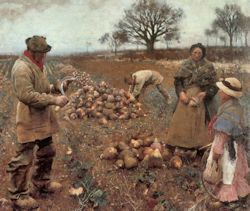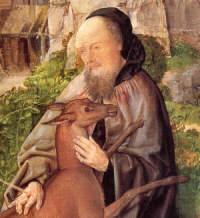Ordinary Time: September 1st
Monday of the Twenty-Second Week in Ordinary Time; Labor Day (USA)
Other Commemorations: St. Giles, Hermit and Abbot (RM)
» Enjoy our Liturgical Seasons series of e-books!
God's great work is the creation and redemption of the world wrought through the death and resurrection of Jesus Christ. The one essential work in which we are all callled to participate is God's transforming love.
The Roman Martyrology commemorates St. Giles (died between 710 and 724) who was an abbot of the seventh century. He probably lived in the neighborhood of Beziers on the coast of the Mediterranean, and died of natural causes. The little monastery of St. Peter, where his body rested, became one of the most popular shrines in Christendom and gave rise to a town. The cult of St. Giles, which was general in France, where there are upwards of one hundred and fifty churches dedicated to him, soon spread throughout the west. He is one of the Fourteen Holy Helpers, but the only one who did not die a martyr.
Today is Labor Day in the United States of America.
Meditation on Work
 God's fundamental and original intention with regard to man, whom he created in his image and after his likeness, was not withdrawn or canceled out even when man, having broken the original covenant with God, heard the words: "In the sweat of your face you shall eat bread." These words refer to the sometimes heavy toil that from then onward has accompanied human work; but they do not alter the fact that work is the means whereby man achieves that "dominion" which is proper to him over the visible world, by "subjecting" the earth. Toil is something that is universally known, for it is universally experienced. It is familiar to those doing physical work under sometimes exceptionally laborious conditions. It is familiar not only to agricultural workers, who spend long days working the land, which sometimes "bears thorns and thistles," but also to those who work in mines and quarries, to steelworkers at their blast furnaces, to those who work in builders' yards and in construction work, often in danger of injury or death. It is also familiar to those at an intellectual workbench; to scientists; to those who bear the burden of grave responsibility for decisions that will have a vast impact on society. It is familiar to doctors and nurses, who spend days and nights at their patients' bedside. It is familiar to women, who sometimes without proper recognition on the part of society and even of their own families bear the daily burden and responsibility for their homes and the upbringing of their children. It is familiar to all workers and, since work is a universal calling, it is familiar to everyone.
God's fundamental and original intention with regard to man, whom he created in his image and after his likeness, was not withdrawn or canceled out even when man, having broken the original covenant with God, heard the words: "In the sweat of your face you shall eat bread." These words refer to the sometimes heavy toil that from then onward has accompanied human work; but they do not alter the fact that work is the means whereby man achieves that "dominion" which is proper to him over the visible world, by "subjecting" the earth. Toil is something that is universally known, for it is universally experienced. It is familiar to those doing physical work under sometimes exceptionally laborious conditions. It is familiar not only to agricultural workers, who spend long days working the land, which sometimes "bears thorns and thistles," but also to those who work in mines and quarries, to steelworkers at their blast furnaces, to those who work in builders' yards and in construction work, often in danger of injury or death. It is also familiar to those at an intellectual workbench; to scientists; to those who bear the burden of grave responsibility for decisions that will have a vast impact on society. It is familiar to doctors and nurses, who spend days and nights at their patients' bedside. It is familiar to women, who sometimes without proper recognition on the part of society and even of their own families bear the daily burden and responsibility for their homes and the upbringing of their children. It is familiar to all workers and, since work is a universal calling, it is familiar to everyone.
And yet in spite of all this toil—perhaps, in a sense, because of it—work is a good thing for man. Even though it bears the mark of a "bonum arduum," in the terminology of St. Thomas, this does not take away the fact that, as such, it is a good thing for man. It is not only good in the sense that it is useful or something to enjoy it is also good as being something worthy, that is to say, something that corresponds to man's dignity, that expresses this dignity and increases it. If one wishes to define more clearly the ethical meaning of work, it is this truth that one must particularly keep in mind. Work is a good thing for man—a good thing for his humanity—because through work man not only transforms nature, adapting it to his own needs, but he also achieves fulfillment as a human being and indeed in a sense becomes "more a human being."
Without this consideration it is impossible to understand the meaning of the virtue of industriousness, and more particularly it is impossible to understand why industriousness should be a virtue: For virtue, as a moral habit, is something whereby man becomes good as man. This fact in no way alters our justifiable anxiety that in work, whereby matter gains in nobility, man himself should not experience a lowering of his own dignity. Again, it is well known that it is possible to use work in various ways against man, that it is possible to punish man with the system of forced labor in concentration camps, that work can be made into a means for oppressing man, and that in various ways it is possible to exploit human labor, that is to say, the worker. All this pleads in favor of the moral obligation to link industriousness as a virtue with the social order of work, which will enable man to become in work "more a human being" and not be degraded by it not only because of the wearing out of his physical strength (which, at least up to a certain point, is inevitable), but especially through damage to the dignity and subjectivity that are proper to him.
—Excerpted from Laborem Exercens
Highlights and Things to Do:
- From Catholic Culture's Library:
St. Giles
 According to tradition, St. Giles was born in Athens, Greece, and was of noble extraction. After his parents died, he fled from his fatherland to avoid followers and fame. He went to France, and in a cave in a forest near the mouth of the Rhone he was able to lead the life of a hermit. Legend notes a hind came everyday to his cell and furnished him with milk. One day the King's hunters chased the hind and discovered St. Giles and his secret hermitage. The hunters shot at the hind, but missed and hit Giles' leg with an arrow, which kept him crippled the rest of his life. He then consented to King Theodoric's request of building a monastery (known later as "Saint Gilles du Gard") and he became its first Abbot. He died some eight years later towards 712.
According to tradition, St. Giles was born in Athens, Greece, and was of noble extraction. After his parents died, he fled from his fatherland to avoid followers and fame. He went to France, and in a cave in a forest near the mouth of the Rhone he was able to lead the life of a hermit. Legend notes a hind came everyday to his cell and furnished him with milk. One day the King's hunters chased the hind and discovered St. Giles and his secret hermitage. The hunters shot at the hind, but missed and hit Giles' leg with an arrow, which kept him crippled the rest of his life. He then consented to King Theodoric's request of building a monastery (known later as "Saint Gilles du Gard") and he became its first Abbot. He died some eight years later towards 712.
In Normandy, France, women having difficulty becoming pregnant would sleep with a picture or statue of the saint.
In England, churches named for St. Giles were built so that cripples could reach them easily. St. Giles was also considered the chief patron of the poor. In his name charity was granted the most miserable. This is evidenced from the custom that on their passage to Tyburn for execution, convicts were allowed to stop at St. Giles' Hospital where they were presented with a bowl of ale called St. Giles' Bowl, "thereof to drink at their pleasure, as their last refreshment in this life."
St. Giles is included in the list of the fourteen "Auxiliary Saints" or "Holy Helpers." These are a group of saints invoked because they have been efficacious in assisting in trials and sufferings. Each saint has a separate feast or memorial day. The group was collectively venerated on August 8, until the 1969 reform of the Roman calendar, when the feast was dropped.
Patronage: abandoned; Beggars; blacksmiths; breast cancer, breastfeeding; cancer patients; crippled people; disabled; epilepsy; fear of night/noctiphobia; forests; handicapped; hermits; horses; insanity; lepers; leprosy; mental illness; paupers; physically disabled; rams; spur makers; woods; against lameness; against leprosy; against sterility; against infertility
Symbols and Representation: arrow, cave, crosier, deer, hind, doe, roe, hermitage
Often represented as:Hand pierced with arrows; hind pierced with arrows; gold doe, pierced by a silver arrow; Benedictine with crosier, arrow piercing hand, protecting hind, Benedictine monk accompanied by a hind, lilies growing in the sand
Highlights and Things to Do:
- Pray to St. Giles for the conversion of England and Scotland.
- Learn more about St. Giles:
- Visit Christian Iconography for images and symbols of St. Giles.
- Visit this site to learn more about the influence St. Giles had in England. Keep in mind that the church was a Catholic Church before Henry the VIII confiscated all the Church's property. This site shows how the reformation affected St. Giles Cathedral in Scotland.
- Read The Golden Legend of St. Giles.
- For children, read In God's Garden—St. Giles by Amy Steedman.
- St. Giles is one of the Fourteen Holy Helpers. Read Legends of the Fourteen Holy Helpers – Saint Giles, Hermit and Abbot. He was invoked against plague, epilepsy, mental illness, and nightmares, for a good confession, and patron of cripples, beggars, blacksmiths, and breast-feeding mothers.






